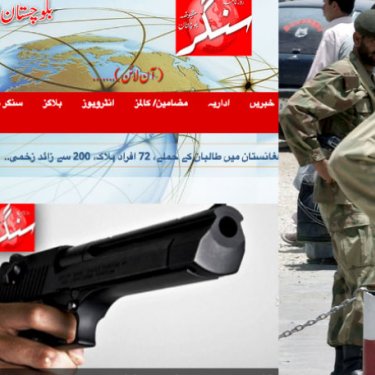Pakistan: Balochi journalists caught between army and rebels

Reporters Without Borders (RSF) is alarmed to learn that two rebel groups in Balochistan, in southwestern Pakistan, have threatened to attack the province’s media if, by 24 October, they have not begun defying a Pakistani government ban on covering rebel activities. RSF condemns the rebel threats and ultimatum, which are unacceptable. At the same time, it calls on the civilian and military authorities to allow journalists to do their work.
Hundreds of people die every year in this remote province’s low-intensity conflict. But it is one of the least covered armed conflicts in the world because the Balochi media are forbidden by the Pakistani authorities to even mention the existence of the province’s armed separatist groups.
As a result, two of these groups, the Balochistan Liberation Front (BLF) and the United Baloch Army (UBA), issued an ultimatum at the start of the month giving all of the province’s journalists until 24 October to start covering their activities.
In a statement posted on the Urdu-language Daily Sangar website (dailysangar.com), BLF spokesman Gahram Baloch said journalists will be exposed to “avoidable harm” of they do not start “behaving.”
“Distribution of newspapers will be suspended in the region after the deadline,” the statement said. “And we warn journalists to stay away from their offices and press clubs. Media workers will be to blame for any harm they suffer.”
“The violent nature of these threats is intolerable, especially as the situation of Balochistan’s journalists has been untenable for years, and we appeal to the rebel groups to immediately renounce any act of violence against journalists,” said Daniel Bastard, the head of RSF’s Asia-Pacific desk.
“This absurd situation would not exist if the Pakistani civilian and military authorities did not violate media freedom by preventing journalists from doing their job in this region. Pakistan must lift the obstacles to the free flow of information throughout its territory and must of course guarantee journalists’ safety.”
“Total news black-out”
Defending the ultimatum, the BLF communiqué blames the local and national media for a “total news black-out” on Balochistan: “Attacks by the military keep on occurring but the foreign media are banned from the region and the local media are reduced to repeating the official version put out by the government and army, according to which everything is fine.”
Khalil Ahmad, the head of the Balochistan Union of Journalists, confirmed to RSF’s Pakistan representative that the provincial authorities regard the rebel groups as “terrorists” and forbid any mention of them in the media.
All possible means are used to force compliance, starting with economic pressure, to which for many local newspapers are particularly susceptible because state advertising constitutes their main source of income.
Judicial pressure is also used. Since 2008, a total of 11 reporters and editors have been given jail sentences for defying the ban on referring to rebel groups. And finally, there has been physical intimidation, violence and torture by the intelligence services, which are often accused of brutality.
Impunity
Around 40 journalists have been murdered since the start of the current conflict in 2006. Impunity is the rule. Few of the cases have led to prosecutions.
So it is high time the federal and regional authorities took concrete measures to protect journalists and overhauled policy on media freedom in Balochistan, which is completely blocked. As an editorial in the leading national daily Dawn said: “Not being dead is a victory in today’s Balochistan if you are a journalist.”
RSF added Balochistan’s armed groups to its list of “Press Freedom Predators” in 2013. Pakistan’s intelligence services are on the latest list, published in 2016. Pakistan is ranked 139th out of 180 countries in RSF’s 2017 World Press Freedom Index.


